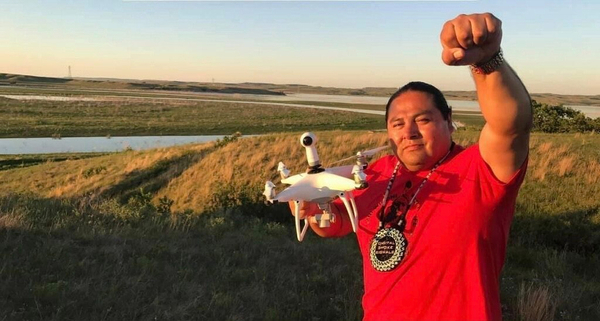
- Details
- By Darren Thompson
Walsh pleaded guilty in April to vehicular manslaughter for the death of Dewey after nearly two years of court proceedings. Dewey’s family and supporters were disappointed in the sentencing, with one of his sons saying it is another example of injustice against Indigenous people.
“My father’s failed justice from Nye County is a clear example of how we as Indigenous are treated and how the white privilege is taken care of,” said Joseph Dewey, one of Myron’s sons, in a statement on Wednesday. “After almost two years of this battle for justice, we were let down even more as Judge Jennifer Klapper showed no compassion as she handed 30 days to a murderer.”
The sentencing comes close to two years after Dewey’s death on Sept. 26, 2021. Walsh wasn’t charged by Nye County officials until July 13, 2022, after Dewey’s family pressured Nye County officials to continue to investigate the car accident.
Walsh was initially charged with driving under the influence resulting in death, and reckless driving resulting in death, after law enforcement found he had cannabinoids in his blood system. He faced 20 years in Nevada state prison.
Dewey was an award-winning filmmaker, journalist, professor and activist from the Walker River Paiute Indian Reservation in Schurz, Nev. He founded Smoke Signals, a multi-media platform to bridge Tribes and technology. One of his most notable contributions to journalism was his live-streaming from the encampments near the Standing Rock Indian Reservation in 2016 and 2017. Thousands of people joined in solidarity with the Standing Rock Sioux Tribe to protest the building of an underground crude oil pipeline—the Dakota Access Pipeline—and Dewey live-streamed on-the-ground events on multi-media platforms.
Dewey co-directed the award-winning 2017 film, “Awake: A Dream from Standing Rock.” The film tells a side of the story of the Indigenous-led, peaceful resistance for clean water, the environment, and the future of the planet in of the largest protest encampments in American history. Dewey’s drone footage of environmental causes earned him a visiting professor status at Duke University in 2021, where he taught rogue journalism at the Center for Documentary Studies.
Walsh was sentenced to 30 days in the Nye County Jail, five months suspended driver’s license, 250 hours of community service, and an 8-hour drug and alcohol class.
“Judge Jennifer Klapper sentenced John Walsh today to a mere 250 hours of community service and one-month county jail for vehicular manslaughter against Myron Dewey,” Deborah Parker, Myron’s former partner and mother of his youngest child, told Native News Online. “Our family is devastated with the result. Justice was not served.”
Walsh avoided a trial and likely a harsher sentence in exchange for a plea. Statistically, defendants who accept a plea arrangement are given a lighter sentence suggestion by the prosecutor, where a judge most often agrees. There are many reasons courts and defendants approach and accept plea arrangements over trial: they cost less, they take less time, and they lower the risk of a harsher punishment.
“The judge chose to acknowledge John Walsh’s attorney’s request for community service even with the fifth district attorney on our family’s side,” Joseph Dewey said. “Historically, systemic racism against Indigenous peoples through the U.S. courts has been going on over 400 years and continues.”
More Stories Like This
Native News Weekly (August 25, 2024): D.C. BriefsUS Presidents in Their Own Words Concerning American Indians
Native News Weekly (January 18, 2026): D.C. Briefs
Federal Judge Orders ICE to Halt Use of Pepper Spray, Arrests of Peaceful Protesters in Twin Cities
Tunica-Biloxi Cultural Leader John D. Barbry Walks On
Help us defend tribal sovereignty.
At Native News Online, our mission is rooted in telling the stories that strengthen sovereignty and uplift Indigenous voices — not just at year’s end, but every single day.
Because of your generosity last year, we were able to keep our reporters on the ground in tribal communities, at national gatherings and in the halls of Congress — covering the issues that matter most to Indian Country: sovereignty, culture, education, health and economic opportunity.
That support sustained us through a tough year in 2025. Now, as we look to the year ahead, we need your help right now to ensure warrior journalism remains strong — reporting that defends tribal sovereignty, amplifies Native truth, and holds power accountable.
 The stakes couldn't be higher. Your support keeps Native voices heard, Native stories told and Native sovereignty defended.
The stakes couldn't be higher. Your support keeps Native voices heard, Native stories told and Native sovereignty defended.
Stand with Warrior Journalism today.
Levi Rickert (Potawatomi), Editor & Publisher

